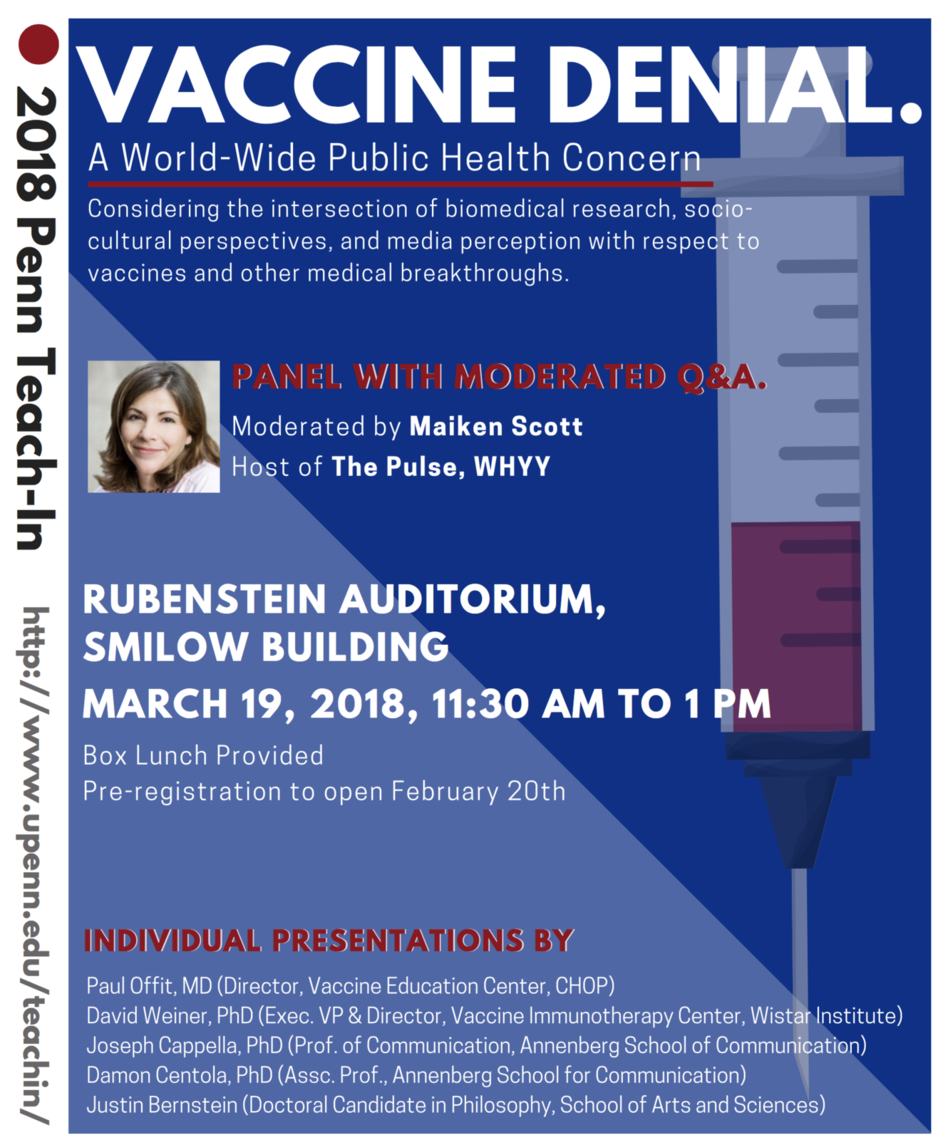
Vaccine Denial: A Worldwide Public Health Concern (PSOM-Sponsored Teach-In 2018 Event)
The discovery and wide implementation of vaccinations against communicable disease is touted as one of modern medicine's greatest breakthroughs for global public health. Potentially lethal diseases such as polio, diphtheria and smallpox are now exceptionally rare in the United States and in many other developed nations. Education and wide-spread vaccination campaigns are to be credited for much of our success. However, gains made in vaccination awareness and acceptance are currently being threatened by a minority of vocal individuals who express concern that vaccination is responsible for the uptick in autism diagnoses. Though the 1998 study from the United Kingdom suggesting a link between a common childhood vaccination and autism was quickly debunked and the first author of that study was found to have had a conflict of interest and subsequently lost his medical license, up to a quarter of citizens polled continued to believe in the link 5 years later. Vaccine denial is just one example of how biomedical findings can become engrained in the consciousness of the public to the point that future research, even research that is more rigorous and accurately negates the original finding, is not considered valid or 'believable'. In most cases the change in knowledge is not due to research malpractice, but to advancements in scientific methods and technologies. Inconsistencies in biomedical research findings overwhelms the public, contributing to the notion that 'the experts don't know what they are doing' because they keep 'changing their minds'. Importantly, the media often latches onto the most sensational of biomedical findings and fails to instill the same kind of passion and balance into their coverage of future research which elaborates on or contradicts the previous findings. The proposed panel will be sponsored by the Perelman School of Medicine at the University of Pennsylvania and consists of the following speakers representing diverse areas of pedagogy and expertise in the topic of vaccine denial, public understanding of medical discoveries and the role of the media in appropriately educating the public regarding biomedical research. As such, this panel is consonant with the overarching goals of the 2018 Penn Teach-In: The Academy in the 21st Century: Production, Dissemination and Use of Knowledge.
Event Format: Panel with Moderated Q&A
Introduction: C. Neill Epperson, M.D. (Professor of Psychiatry, Perelman School of Medicine)
Panel Moderator: Maiken Scott, Senior Reporter, WHYY and The Pulse
Panelists:
- 1. Paul Offit, M.D.,'(Director, Vaccine Education Center, Professor of Pediatrics, CHOP) Overview of Vaccine Safety and the Origins of Vaccine Denial.
- 2. David Weiner, Ph.D. (Exec VP & Director, Vaccine and Immunotherapy Center, Wistar Institute) Developing New Vaccine Technologies in a Complex World
- 3. Joe Cappella, Ph.D. (Professor of Communication, Annenberg School for Communication) Mechanisms of Social Influence in Vaccine Confidence
- 4. Damon Centola, Ph.D. (Associate Professor, Annenberg School for Communication) How Vaccine Attitudes Spread: Network Dynamics of Behavior Change
- 5. Justin Bernstein (Doctoral Candidate in Philosophy, School of Arts and Science) Race and Vaccine Acceptance
- 6. Maiken Scott, (Senior Reporter, WHYY and The Pulse) The Media: Partner or Foe in Dissemination of Biomedical Research Findings
Please send any questions to Neill Epperson at cepp@mail.med.upenn.edu
 Back to Faculty Announcements
Back to Faculty Announcements